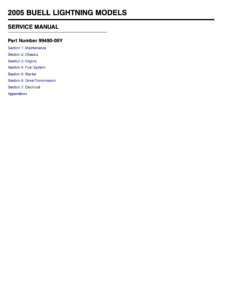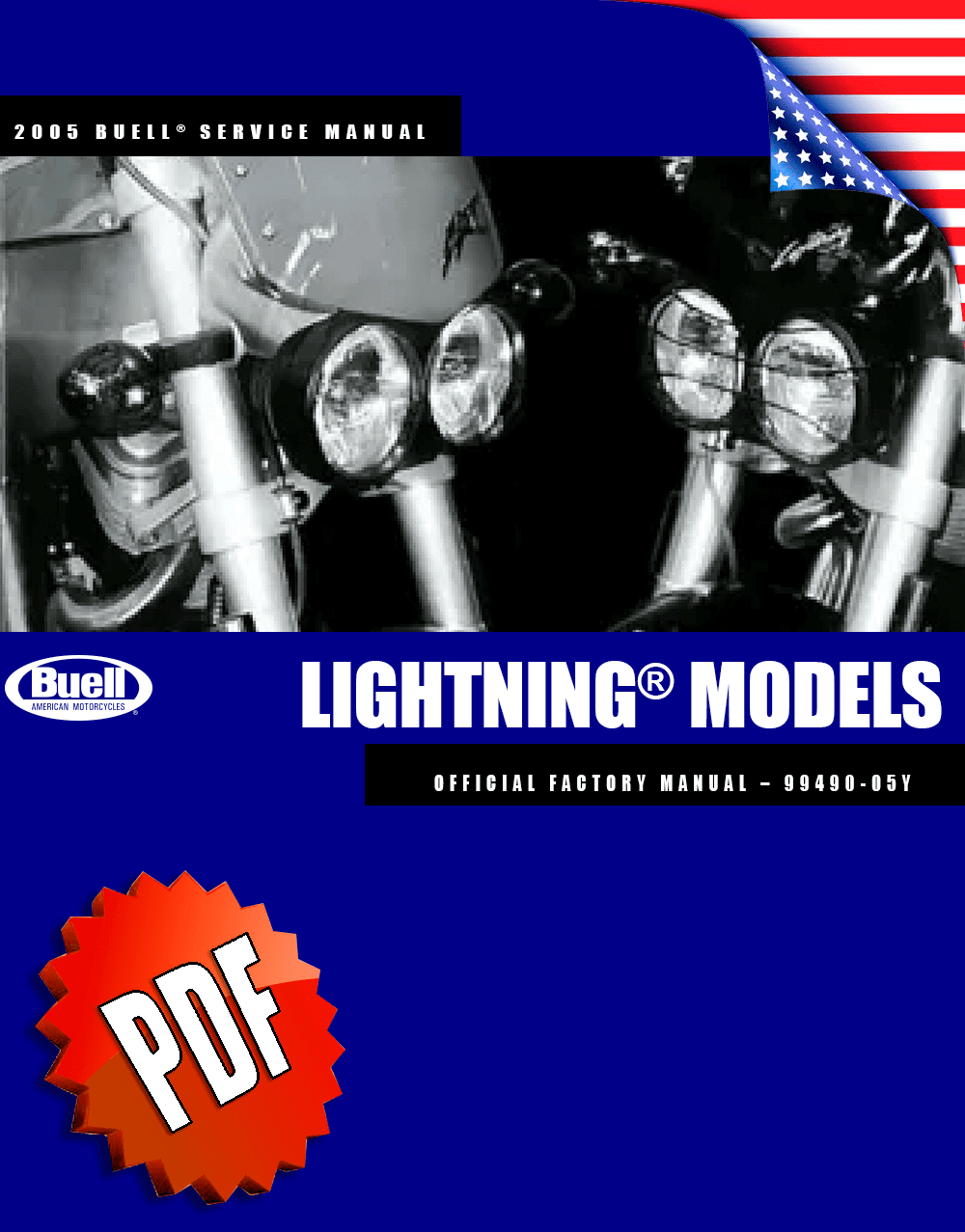Complete PDF version of the Service Manual for the Buell Lightning Models. A MUST for every Lightning owner.
Download: Immediately after payment!
OEM Original factory workshop manual.
Models covered by this manual: 2005
Number of pages: 587 pages
Table of contents:

This PDF repair manual can be downloaded right after the payment process in complete, on the device of your choice.
We do not offer printed manuals, for the following reasons:
- it is more eco-friendly to use a digital version
- your manual never gets dirty or greasy
- you can always choose to print the specific page(s) you need to work on your bike
- you receive your manual immediately after payment
- it is searchable
Buell Lightning Models
The XB powerplant was based on the Harley Sportster powertrain and was intended for both projects. Unfortunately, Harley designed it with little assistance from Buell. Aerocharger was supposed to supply a turbocharger to assist boost the XB’s horsepower to 150 hp (110 kW), but the agreement fell through when Harley-Davidson opted to design one in-house. Despite “millions of dollars” spent, that endeavor was a flop.
Before the first XB was sold, the cost was far more than expected, resulting in a price rise from $7,995 to $9,995. It was a popular bike, but it never sold at the predicted volume for the Harley marketing department, owing in part to the much higher price.
Buell first used the XB frame on the Firebolt XB9R sportbike in 2002. The Firebolt XB12R was debuted in 2004, with the lower displacement Firebolt XB9R. Buell introduced the Lightning in 2003 as a streetfighter motorbike. The XB9 engines were 984 cc (60.05 cu in) in displacement, while the later XB12 engines were 1,203 cc (73.4 cu in). The XB12 engine featured a longer stroke of 96.82 mm (3.812 in) than the XB9 engine, which had a stroke of 79.38 mm (3.125 in). Both engines had the same cylinder bore size of 88.9 mm (3.50 in).
The Buell Ulysses XB12X was introduced in July 2005. It included seating, ergonomics, and long-travel suspension that were appropriate for usage on unpaved and rugged roads. The Ulysses was marketed by Buell as “the world’s first adventure sportbike.” Among other changes for 2008, the XBRR oil pump and ignition timing systems have been changed, as has the addition of heated grips and an increase in turning fork swing from 54° to 74°. In various ways, the Ulysses XB12XT varies from the Ulysses XB12X. It features a different front fender than the XB12X, and the lower fork protection is not as pronounced as on the XB12X, due to the XB12XT’s primary function, which is more street than dirt orientated.
Other significant differences between the two motorcycles include the suspension, which is nearly an inch lower on the XB12XT and set more for street riding, against the XB12X’s somewhat higher and softer suspension, which is better designed for dirt use. Along with factory Hepco & Becker hard panniers and top box, a tall windscreen, and a 30.9 in (785 mm) seat height, the XB12XT includes wheels that are around 1 pound (450 g) lighter than those found on the XB12X, which have increased bulk to make them sturdier for off-road usage. The XB12XP is a police model that was launched in 2009 for the model year.
XB2 type
(different frame with more fuel capacity, longer swing arm & wheelbase, 23.8°/23.5° steering axis angle, more trail)
- Lightning Long XB12Ss
- Lightning Super TT XB12STT
- Ulysses XB12X
- Ulysses XB12XP
- Ulysses XB12XT
Source: Wikipedia


